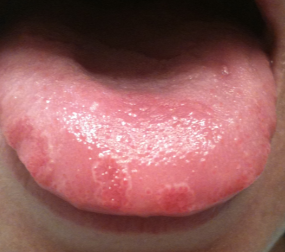 Sores on the tongue are typically white or yellow, though they may turn gray as they begin to heal. They are typically 1cm or smaller, though in more severe cases they can be larger. Larger ulcers are not necessarily more severe than those which are smaller.
Sores on the tongue are typically white or yellow, though they may turn gray as they begin to heal. They are typically 1cm or smaller, though in more severe cases they can be larger. Larger ulcers are not necessarily more severe than those which are smaller.
In most cases these ulcers are not serious and will fade on their own. Those who receive chronic mouth sores may need to see a doctor to determine the cause. There may be an underlying cause to the sores which will require treatment to eliminate your discomfort.
Causes of Tongue Ulcer
- Canker sores: the most common cause of ulcers on the tongue is canker sores. These white or yellow blisters typically develop from a red patch or cut in the mouth which fills with pus as the sore grows. Canker sores come in a variety of sizes and typically have an irregular shape. Cuts in the mouth, hormonal changes, the end of the menstrual cycle, stress or a lack of iron, B-12 and folic acid in the diet can trigger the development of a canker sore. These sores are not dangerous, though they can be uncomfortable.
- Poor oral care: tongue ulcers can occur due to poor oral care. A recent injury to the tongue can cause a blister to form as the infection heals. Biting the tongue will commonly cause these types of sores to develop because this creates an easy entrance for bacteria. Poor oral hygiene can also contribute to frequent ulcers developing on the tongue. As food and other particles collect on the teeth and gums, they can allow bacteria to grow which will start to irritate the flesh in the mouth.
- Infections in the mouth can manifest themselves as sores on the tongue. These sores will often appear in other parts of the mouth in addition to those which appear on the tongue itself. Gingivostomatitis, caused by viral or bacterial infection, infection of the herpes simplex virus, oral thrush, an oral yeast infection, or oral lichen planus, an immune system disorder can lead to sores developing throughout the mouth, most notably on the tongue. Those who develop sores on the tongue often may suffer from leukoplakia, a condition that causes chronic irritation of the tongue.
- Oral cancer: if the sores on the tongue are severe, do not fade after a few days or become discolored there may be a more serious issue causing them. Serious infections that do not heal or impact your ability to eat and drink properly should be addressed by a doctor. Sores that grow very quickly or appear to become hard may be a sign that you are developing oral cancer.
Patients suffering from ulcers on the tongue may also develop a general feeling of discomfort or uneasiness throughout the body. If the infection has started to spread, the lymph nodes may become swollen or you may develop a slight fever.
Treatments for Tongue Ulcer
Most ulcers on the tongue can be managed with home remedies. The ulcers will typically heal on their own, but remedies can be used to limit the pain and quicken the time it takes to rid the sore.
- Rinsing the mouth with salt water is a common recommendation for those suffering from ulcers in the mouth. You can also create a paste with salt and water which can be applied directly to the tongue, though this can be uncomfortable.
- Food remedies such as applying butter to the ulcer can minimize the pain. You can also create a paste of peepul tree leaves or honey to help the ulcer heal more quickly. Milk from a banyan tree can also increase heal time, but this cure should only be applied in the morning or evening when it will not interfere with eating. Consuming papaya, green bananas or apples have also been shown to help ulcers on the tongue heal. Some recommend consuming milk or curds to increase your calcium intake as this can help your body fight off the sore. Canker sores can be treated with medication that will dull the pain and help the ulcer heal.
- Keeping the mouth clean is essential when you are battling ulcers. Brush your teeth regularly and use mouth wash or a salt rinse to rid your mouth of excess bacteria or irritants. Be gentle when cleaning around the ulcer as your toothbrush bristles can cause irritation to the sore which can make your condition worse.
- Eliminate items like hot foods, foods which are spicy or acidic while your sore is healing as this can cause further irritation.
Note: If your sores do not get better within a few days, they appear to be growing or you develop sores frequently then you should see a doctor to determine if you need medication.
